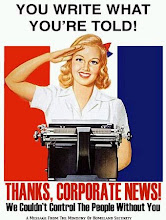 Roberto Michele, new Honduran president - former head of the Honduran Congress
Roberto Michele, new Honduran president - former head of the Honduran CongressBY FRANCES ROBLES
TEGUCIGALPA, Honduras -- At the close of the one of this week's nightly news broadcasts, Channel 21 news anchor Indira Raudales made a plea: ``We have a right to information! This can't be happening in the 21st century!''
If Raudales offered more details, viewers did not hear them: the screen briefly went to static.
Her on-air appeal for freedom of the press came as the newly installed Honduran government kept several news outlets closed, detained international reporters, and periodically interrupted the signal of CNN en español.
Reporters for The Associated Press were taken away in military vehicles and Venezuela's Telesur network -- and any other station supportive of toppled president Manuel Zelaya -- are still off the air.
Stations that are broadcasting carry only news friendly to the new government. Several local papers have yet to publish information about Zelaya's international support in neighboring countries.
''They militarized Channel 36, which is owned by me,'' said Efdras López, director of the show, ''Asi se Informa.'' ``They brought more than a battalion -- 22 armed men -- took the channel and said nobody could come in and nobody could come out.
``I own this building!''
The crackdown on the media began before dawn Sunday, when hooded soldiers entered the presidential palace by force and captured Zelaya, a leftist firebrand who had vowed to defy the supreme court, congress and the attorney general's office in a quest to hold a referendum. The nation's media went black while Zelaya was flown out of the country.
When a new government presided by former head of Congress Roberto Micheletti was installed a few hours later, only the radio and TV stations loyal to the establishment were allowed to broadcast.
Citing a daily newspaper, the InterAmerican Press Association reported that Zelaya supporters in Tegucigalpa and San Pedro Sula attacked reporters and photographers, as well as destroyed newspaper-vending kiosks. The advocacy group also reported that soldiers stormed into a TV station and newspaper newsrooms, ordering a halt to operations.
''We are deeply concerned by reports that several broadcasters have been taken off the air,'' said Committee To Protect Journalists' Americas senior program coordinator Carlos Lauría. ``We call on those in power to allow the resumption of all broadcasts and ensure that all journalists can work freely and safely at this critical time for Honduras.''
López said his station was targeted because of his past critical coverage of Micheletti and Gen. Romeo Vásquez, the head of the armed forces.
''There are journalists who Zelaya paid to insult me morning, noon and night,'' said National Human Rights Commissioner Ramón Custodio López. ``There is no censorship in Honduras. We have simply asked the media not to feed the conflict. The media that are closed are the ones that were feeding hate.''
Custodio, the government ombudsman, said he has not received any complaints from the press.
''If I get a complaint, I will investigate it,'' he said.
If news outlets are leaving out chunks of the story, Custodio said, it's because they have the right to publish only the information that interests them.
''Who are we supposed to turn to when the government human rights commissioner is justifying this coup?'' said Andrés Molina, a correspondent for Venezuela's Telesur network, which is off the air. ``The military picked up our reporters off the street and held them for two hours. Later they said it was a mistake. How can it be a mistake, when these people are going around with cameras, microphones and media credentials?''
He stressed that Telesur is often criticized for being a ''leftist station out of Caracas'' but ``how then do you explain that they are taking CNN off the air too?''
''This is not ideology,'' he said. ``This is abuse.''
Micheletti's spokesman René Zepeda, himself a longtime journalist here, told reporters that if it were his decision, all stations would be broadcasting. The Zelaya administration's channel 8, he said, would return after consultation with lawyers.
A 2008 report by the Open Society Institute said government payments to the press were widespread. A report by the InterAmerican Dialogue think tank in Washington said the Honduran media operate as arms of political parties.
''One of the largest threats to Honduran democracy is the lack of independence of the Honduran media,'' according to the paper written by Manuel Orozco and Rebecca Rouse. ``The media have failed to fulfill their social function as government watchdogs, are controlled by business and political interests and do not practice fair reporting practices.''
http://www.miamiherald.com/news/americas/story/1122536.html












No comments:
Post a Comment